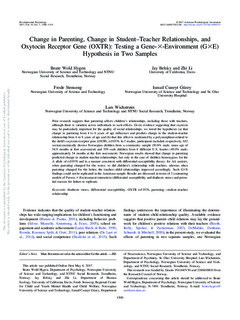| dc.contributor.author | Hygen, Beate Wold | |
| dc.contributor.author | Belsky, Jay | |
| dc.contributor.author | Li, Zhi | |
| dc.contributor.author | Stenseng, Frode | |
| dc.contributor.author | Guzey, Ismail Cuneyt | |
| dc.contributor.author | Wichstrøm, Lars | |
| dc.date.accessioned | 2017-12-11T09:19:23Z | |
| dc.date.available | 2017-12-11T09:19:23Z | |
| dc.date.created | 2017-08-17T11:33:14Z | |
| dc.date.issued | 2017 | |
| dc.identifier.citation | Developmental Psychology. 2017, 53 (7), 1300-1315. | nb_NO |
| dc.identifier.issn | 0012-1649 | |
| dc.identifier.uri | http://hdl.handle.net/11250/2469900 | |
| dc.description.abstract | Prior research suggests that parenting affects children’s relationships, including those with teachers, although there is variation across individuals in such effects. Given evidence suggesting that oxytocin may be particularly important for the quality of social relationships, we tested the hypotheses (a) that change in parenting from 4 to 6 years of age influences and predicts change in the student–teacher relationship from 6 to 8 years of age and (b) that this effect is moderated by a polymorphism related to the child’s oxytocin receptor gene (OXTR), rs53576. In 2 studies, participants included, respectively, 652 socioeconomically diverse Norwegian children from a community sample (50.8% male; mean age of 54.9 months at first assessment) and 559 such children from 8 different U.S. locales (49.0% male; approximately 54 months at the first assessment). Norwegian results showed that change in parenting predicted change in student–teacher relationships, but only in the case of children homozygous for the A allele of rs53576 and in a manner consistent with differential-susceptibility theory: for AA carriers, when parenting changed for the worse, so did children’s relationship with teachers, whereas when parenting changed for the better, the teacher–child relationships improved accordingly. Such G×E findings could not be replicated in the American sample. Results are discussed in terms of 2 contrasting models of Person-×-Environment interaction (differential susceptibility and diathesis stress) and potential reasons for failure to replicate. | nb_NO |
| dc.language.iso | eng | nb_NO |
| dc.publisher | American Psychological Association | nb_NO |
| dc.title | Change in parenting, change in student-teacher relationships, and oxytocin receptor gene (OXTR): Testing a Gene-×-Environment (G×E) Hypothesis in Two Samples | nb_NO |
| dc.type | Journal article | nb_NO |
| dc.type | Peer reviewed | nb_NO |
| dc.description.version | publishedVersion | nb_NO |
| dc.source.pagenumber | 1300-1315 | nb_NO |
| dc.source.volume | 53 | nb_NO |
| dc.source.journal | Developmental Psychology | nb_NO |
| dc.source.issue | 7 | nb_NO |
| dc.identifier.doi | 10.1037/dev0000333 | |
| dc.identifier.cristin | 1486885 | |
| dc.relation.project | Norges forskningsråd: 191144 | nb_NO |
| dc.description.localcode | © 2017 The Authors. Published by American Psychological Association. | nb_NO |
| cristin.unitcode | 194,67,40,0 | |
| cristin.unitcode | 194,65,35,5 | |
| cristin.unitcode | 194,65,35,0 | |
| cristin.unitname | Institutt for psykologi | |
| cristin.unitname | RKBU Midt-Norge - Regionalt kunnskapssenter for barn og unge - psykisk helse og barnevern | |
| cristin.unitname | Institutt for psykisk helse | |
| cristin.ispublished | true | |
| cristin.fulltext | original | |
| cristin.qualitycode | 2 | |
